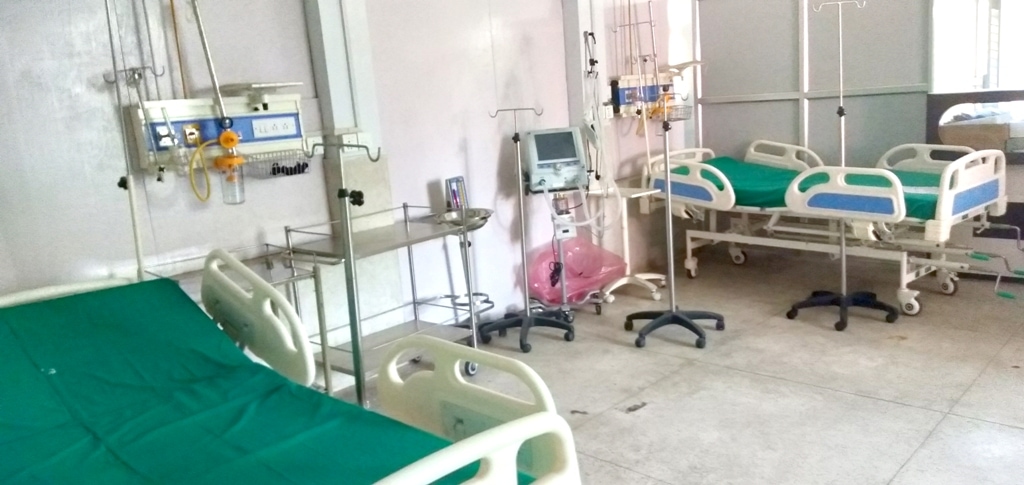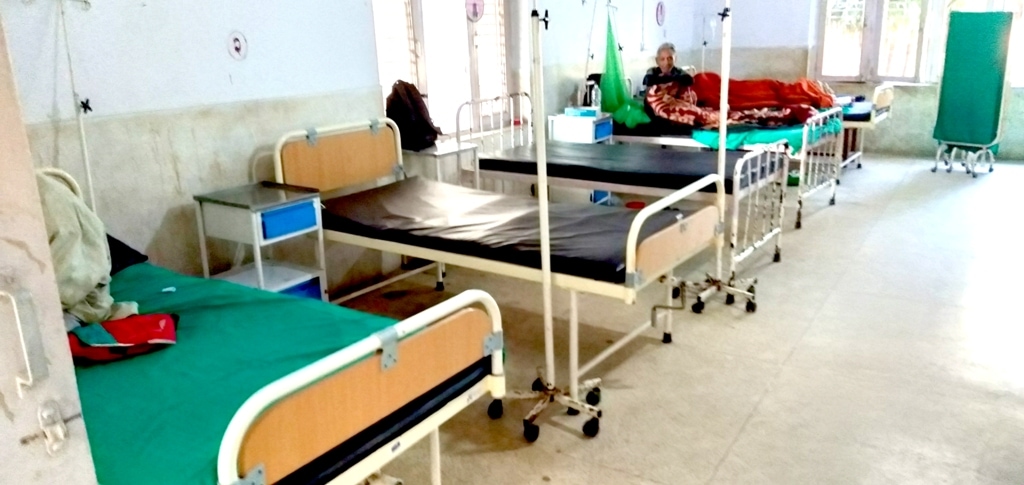Even the doctors, who are supposed to provide health services to people, ignore the far western region, as illustrated by the story of Mahakali Zonal Hospital
Prakash Singh and Bhageswari Shah: Centre for Investigative Journalism-Nepal
On July 23, 2012, orthopedic doctor Narendra Bikram Gurung arrived at Mahakali Zonal Hospital after being posted here. Having just work at the hospital for two days, he managed to have himself transferred to the Western Regional Hospital in Pokhara. Despite his posting in Mahakali Hospital, Gurung remained in Pokhara. After two years, he was transferred to the regional hospital of the city.

Absence of patients even in common wards due to lack of specialist doctors in Mahakali Zonal hospital
On October 19, 2012, surgeon Sojan Sapkota arrived at Mahakali Hospital, but 10 months later, he was transferred to Seti Zonal Hospital in Dhangadhi. Dr. Sher Bahadur Kunwar, who had arrived at Mahakali Hospital on October 19, 2012 was transferred to Seti Zonal Hospital less than 6 months on. Medical officer Hemanta Ojha arrived here on December 7, 2014, but after attending the office for two days, he returned to the Department of Health with a letter of temporary transfer.
In 2015-16, three specialist doctors were transferred to the hospital which is in the frontier district of the far-western region. On February 25, 2016, gynecologist Salina Khadka was posted to the hospital, but she was transferred to Prashuti Griha in Kathmandu. Orthopedic Dr. Arjun Prasad Dumre, who had been posted on the same day, joined police service whereas pediatrician Dr. Susan Bhattarai was transferred to Kanti Children’s Hospital in July, 2016. Surgeon Dr. Ghanashyam Thapa had been posted to the hospital on April 8, 2016 as medical officer, but he went on another assignment in July that year. In November, 2016, he was transferred to National Trauma Centre in Kathmandu. Radiologist Ritesh Thapa, who was appointed under a contract, left for Dhangadhi after a month.
A further research can reveal a long list of such transfers, on assignments and recalls. The hospital refused to provide information, but after we prepared to file a right to information, they provided the information. That information helped us draw a portrait of a hospital without doctors. The Mahakali Hospital began as a health center in 1967 and became a district hospital in 1984. It was upgraded to Zonal Hospital in 1986. As of now, not a single specialist doctor as per the vacancy has served at the 100-bed Mahakali Zonal Hospital. “Ever since it was established in 1986, not a single specialist doctor and medical officer has come and worked at the hospital. The situation is still the same now,” said Hari Kumar Shrestha, the hospital’s medical superintendent.
The hospital has vacancies for 21 specialist doctors, but only three are employed. Three specialists currently employed–Gynecologist Dr. Hari Kumar Shrestha, General Surgeon Dr. Shri Krishna Shrestha and Orthopedic Surgeon Dr. Rojan Tamrakar—are ninth level officers. Vacancies for four 11th level officers including the board of directors and Medical Superintendent remain open. The hospital also has vacancies for seven medical officers, but these positions remain vacant. The position for medical technologist (one) and senior nursing officers (two) has remained vacant since the hospital’s founding. Thus, Mahakali Zonal Hospital has been treated like an unwanted child, who is neglected and left on its own. The story of scarcity, neglect and backwardness surrounding Mahakali Hospital shows that far-western region has also been ignored by medical doctors.
Hospital only for referral
Two-year-old Bhuwan Khadka of Bhimdatta Municipality-12 of Kanchanpur was admitted to the hospital on November 13, 2018 after a complaint of severe pneumonia. However, the hospital cited lack of specialist care and referred the case to Seti Zonal Hospital in Dhangadhi. Raju Nepal, who required a minor operation for his injuries, was admitted to the hospital on November 9, 2018, but was referred to Dhangadhi two days later. Similarly, Laxmi Devi Chaudhary, who was admitted to hospital after respiratory infection and diarrhea, was also referred to Dhangadhi.
Between November 9 and November 19, 2018, Mahakali Zonal Hospital referred 24 patients to Seti Zonal Hospital and Nepalgunj. In the Nepali months of Sawan, Bhadau and Asoj (mid-July to mid-October) 104, 124 and 81 patients were admitted to the hospital, respectively. But they were refered to another hospital due to lack of special care, according to the hospital’s medical supervisor Narad Bhatt.
The fact that the hospital cannot even carry out a general operation can surprise anyone. But that’s been the reality of Mahakali Zonal Hospital. The hospital doesn’t conduct operation related to orthopedic, general surgery and gynecology. Lack of human resource was the main reason behind it, said Keshav Datta Joshi, the hospital’s information officer. Until four years ago, the hospital carried out normal operations, but now even minor operation is refered elsewhere, he added.
Since the hospital doesn’t carry out surgery, the surgical wards are in disarray. “These wards and beds would have been clean had there been operations,” said Kaushila Rana, the indoor in-charge of the hospital. “Since there’s no surgery, no one is bothered about it.”
Only emergency delivery services are conducted in the hospital. Women who cannot naturally give birth to a child are operated upon. Apart from this, all other surgery cases are referred to other hospitals. Though the hospital refers cases to Dhangadhi, Nepalgunj and Kathmandu, employees advise patients to go to hospitals across the border in Indian towns of Pilibhit and Khatima. Most patients who travel to India are cheated.
Due to lack of specialist services, patients are not required to undergo tests. As a result, laboratories are rarely used. Lab Technician Mahesh Raj Joshi said, “We do normal check-ups in the lab now.”
Despite having a vacancy for a radiologist (for ultrasound), the hospital doesn’t have one. Medical Superintendent and Gynecologist Dr. Hari Kumar Shrestha himself performs the job. “I cannot always do it, but I do ultrasound on Monday and Thursday because we don’t have anyone here,” Shrestha said. “A pregnant woman needs to undergo an ultrasound test, so I have designated two days every week for the work.”
Three years ago, the Health Ministry provided equipment and materials to Mahakali Zonal Hospital to operate Intensive Care Unit (ICU). But, ICU has not operated yet. The hospital needed a team of experts to operate the ICU, but the ministry was yet to send the team, according to Dr. Gunaraj Awasthi, the health director of far-western province. “We face a problem in which specialist doctors don’t want to be posted here,” Awasthi said. “If the ICU had been operated, we could have treated 90% of cases that were refered to other hospitals.”
A forgotten frontier
Nepal’s first woman health minister, Dwarika Devi Thakurani, was from the far-west. She served as the state minister of health in the 1960s. In 1999, Bhakta Bahadur Balayar, from far-west, has also been state minister of health. Dr. Dirgha Singh Bam and Dr. Laxmi Raj Pathak, who are from far-west, have served as health secretary. Pathak was also the Director General of Department of Health.
 Dr. B.D. Chataut, Dr. Mahendra Bahadur Bista and Dr. Bhim Singh Tinkari, who have worked at the Department of Health, are also from the far-west. Senior eye specialist Dr. Chet Raj Panta was a member of the National Planning Commission. Padam Bahadur Chand served as the Head of Policy and Planning and Foreign Aid in the Ministry of Health for a long time.
Dr. B.D. Chataut, Dr. Mahendra Bahadur Bista and Dr. Bhim Singh Tinkari, who have worked at the Department of Health, are also from the far-west. Senior eye specialist Dr. Chet Raj Panta was a member of the National Planning Commission. Padam Bahadur Chand served as the Head of Policy and Planning and Foreign Aid in the Ministry of Health for a long time.
Senior Gynecologist Dr. Padam Raj Panta, also a professor of Tribhuvan University, is from the far-west. Director of Tripureshor Eye Hospital, Dr. Khakda Bahadur Khadka, Radiologist (11th level) Dr. Yagya Raj Pathak, now working in Koshi Zonal Hospital, Yadav Bhatta, who previously worked at Gangalal Hospital and now at Norvic Hospital, Anesthetist Dr. Birendra Bahadur Singh, all of these prominent people of health sector were born and grew up in the region.
Dr. Guna Raj Awasthi, Health Director of the Far West Province, hails from Baitadi. Though many people reached top positions in the country’s health sector, locals haven’t benefited from it, he said. “First, the government does not even want to send experienced people here. Even if it does, people don’t want to be posted here.” Awasthi said, “Their salary is lower, there’s no opportunity to work in private hospitals. This situation has prevailed in Mahakali Zonal Hospital for many years now.”
Dr. Laxmi Raj Pathak, who has served as director general of the Department of Health and officiating secretary in health ministry, said, “When I was in the ministry, I tried to send specialist doctors to the hospital. But even if you transfer them, they lobby to ministers and politicians to cancel it. Not a single doctor is willing to go there.”
Dr. Dirgha Singh Bam, a renowned chest disease specialist in South Asia, served as officiating secretary in the health ministry. “When a doctor is deputed to the hospital, a minister puts pressure not to do so. If we transfer him or her to the hospital, they return after a few days of attendance. The problem is that we don’t have politicians or ministers willing to send an experienced doctor to the region.”
In 1999, Bhakta Bahadur Balayar of Doti district became the Minister for Health for 10 months. Balayar also has similar experience. He said, “Due to lower salary and lack of opportunities to work in private hospitals, doctors don’t want to go far-west. I also tried to send them, but they used powerful people to support their refusal.”
Dr. Pathak, the former secretary of Health Ministry, said attacks on and abuses of doctors have also caused fear among many of them. “Incidents of attacks and abuse on doctors have been ongoing,” he said, “Also, local people and hospital development committees also don’t help doctors.”
Doctors under attack
In February, 2017, locals abused Hari Kumar Shrestha, Medical Superintendent of Mahakali Zonal Hospital. He came under attack after a woman died during medical treatment. A week after being discharged from the hospital after a surgery of her ovary, she was admitted again. She died a few hours later. “She died of heart attack, but her relatives blamed it on operation and tried to abuse us,” Dr. Shrestha said. “After the incident, it was difficult stay at the hospital, but I am still here.”
Four months earlier, angry relatives of a patient who died at the hospital attacked Medical Officer Dr. Satya Koirala. After this incident, he could not stay in the hospital. He resigned in November last year and went home.
In July, 2010, Gynecologist Dr. Khagendra Bhatta was attacked in connection with a post mortem. After people starting shouting slogans against him, it became impossible for him to stay there. So, the government transferred him to Seti Zonal Hospital in Dhangadhi. This incident discouraged many other doctors. According to Keshav Datta Awasthi, the hospital’s Information Officer, after the news about the incident spread, doctors have hesitated to come here.
Local residents and politicians can play an important role to create conducive environment for the health professionals in the hospital. However, even a minor problem is provoked in the Mahakali Zonal Hospital. It leads to protest at the hospital. The local political party cadres add fuel to the fire.
Kamal Niranjan Bhat, secretary of Civil Society in Kanchanpur, said bad news about the hospital had spread far and wide. “Indian hospitals use Nepal’s newspapers, radio, cable TV to advertise their services,” he said. “On the other hand, abuse of doctors is widespread in our area. The doctors don’t trust that the hospitals can provide them a safe working environment.”



